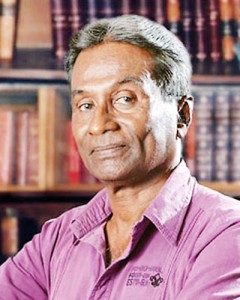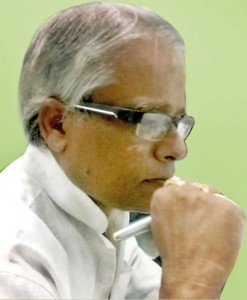News
Astrologers grapple with ticking time bomb

Ananda Seneviratne
The astrologer who raised concerns about auspicious times released by the Cultural Ministry before the Sinhala and Tamil New Year insisted that his calculations were correct.
Controversy erupted when astrologers blamed faulty auspicious times for the collapse of the Meethotamulla garbage dump, which buried dozens of innocents.
However the astrologers in the panel that prepared the official times insisted that their predictions were not connected with the tragedy.
G.M. Gunapala, 73, a senior astrologer and a member of the Auspicious Times Committee, claimed that the meal time was inaccurate.
According to him, considering the position of planets, a combination called ‚Äúmalapudu‚ÄĚ (noose/trap) was formed during that period, generally believed to be dangerous.
‚ÄúAs the name itself suggests this combination causes sudden, unexpected tragedies,‚ÄĚ he said. But, he said, other auspicious times including the time for lighting the hearth was accurate.
He said that although he had informed other members of the Auspicious Times Committee, no one paid attention. ‚ÄúI logically proved this inauspicious planetary combination citing ancient books such as Varahamihiriya and Saravaliya written by King Kalyanavarma,‚ÄĚ he said.
He noted that majority of the astrologers in the panel were aware that the auspicious time was wrong, but were reluctant to express that openly.
Mr Gunapala who had been practising astrology for 57 years, also alleged the auspicious colours were not practical either. ‚ÄúWe had to wear gold to light the hearth but white and blue were required for meal time.‚ÄĚ
‚ÄúIn 2009 when we defeated terrorism there was a powerful auspicious time for the New Year to light the hearth and eat meals, 5.05 a.m. and 5.50 a.m.respectively. This year the auspicious times I proposed were 5.05 a.m. and 5.53 a.m. We have missed the opportunity of a powerful auspicious time,‚ÄĚ he said.
He noted that adverse effects can be mitigated through relevant traditional rituals. Explaining the rituals, he suggested chanting of the ‚Äėthun sutra‚Äô in 108 or more places representing all the regions, and chanting ‚Äėdasadisa piritha‚Äô more than 1,085 times.

G.M. Gunapala
He also alleged that astrology has now been commercialised and many in the committee had no expertise in the subject.
But, Ananda Seneviratne, another leading astrologer and a member of the Auspicious Times Commitee, disputed the arguments made by Mr Gunapala. He insisted that there was no link between the New Year auspicious times and the collapse of the garbage dump.
‚ÄúThe garbage dump started to collapse at about 12-1 in the morning. New Year rites were performed at 5:41 a.m. and 7:05 a.m. If there is a link between these two as they say it might be because of those that followed the wrong alternative auspicious times they introduced,‚ÄĚ he said. ‚ÄúThe ascendant they based their predictions on when preparing their auspicious times was not suitable for the country.‚ÄĚ
He also noted that attempts were being made to gain cheap publicity.
‚ÄúThe community spirit and other good values are challenged because of these things. Disrupting the traditions of doing the same thing at a same time facing the same direction is not good.‚ÄĚ
Mr Seneviratne, a member in the committee since its beginning, said all members agreed on the times.
He suggested that controversies are caused by how one interprets the auspicious times and not because of a fault in astrology.
Another astrologer, Chintha Katipearachchi, told the Sunday Times that she was not satisfied with the auspicious times.
Ms Katipearachchi, who is not a member of the committee, said the time for lighting the hearth was flawed. She said carelessness had caused the error.
Samitha Perera, development assistant and the coordinator of the Auspicious Times Committee of the Department of the Cultural Affairs, said controversies harm cultural values and will adversely affect the future generations’ belief in astrology.
Explaining how auspicious times are arrived at, Mr Perera said two meetings are held each year. ‚ÄúFirst, astrologers are asked to suggest their own auspicious times. Then they discuss them together and meet again within the following two weeks where the final decision is taken,‚ÄĚ he said. The times then are handed to the Ministry of Home Affairs by August and the almanac is printed by November or December.
‚ÄúThey had adequate time to express their objections for the auspicious times as these were formulated in June 2016,‚ÄĚ he said. He also noted that all the auspicious times are based on an almanac called ‚Äėpanchanga litha‚Äô and out of five people in Sri Lanka engaged in preparing it,¬† four are also members of the Auspicious Times Committee. ‚ÄúThis is a serious problem. The ministry will take strict action against those that harm our culture and the traditions. There are plans to release the auspicious times to the media by August starting from the 2018 New Year customs,‚ÄĚ he said. He said that the minister had also taken notice of the situation and a final decision will be taken within the next few weeks.
The Department of the Cultural Affairs said it will act against those that harm the cultural values, and if necessary, culpable people in the committee will be removed. A final decision has not been made.

